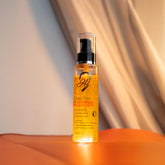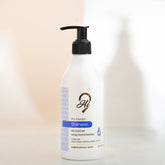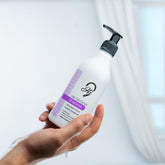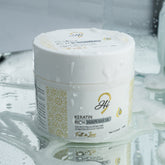Transform Your Tresses with the Best Hair Mask for Frizzy Hair
Are you struggling to tame your unruly locks? A hair mask for frizzy hair might be the ultimate solution you need! Frizz can make even the healthiest hair appear dull, dry, and hard to manage. Whether caused by humidity, heat styling, or environmental stress, frizz can take a toll on your confidence. But don’t worry—regularly using a nourishing hair mask can restore smoothness, shine, and manageability to your hair.
Why Hair Becomes Frizzy
Before diving into the solution, it’s important to understand why hair becomes frizzy:
- Lack of Moisture: Frizz is often a sign of dehydration. When hair lacks sufficient moisture, the cuticle layer lifts, causing strands to appear puffy and uneven
- Excessive Heat Styling: Using curling irons, straighteners, or blow dryers frequently can remove your hair’s natural oils, leaving it weakened and more susceptible to frizz.
- Environmental Factors: Regular use of hair dryers, straighteners, or curling irons can strip away natural oils, weakening the hair and making it more prone to frizz.
- Chemical Treatments: Hair coloring, bleaching, or chemical straightening can damage the cuticle, increasing frizz and breakage.
- Wrong Hair Products: Shampoos with sulfates or harsh chemicals can strip natural oils, making your hair harder to control.
The Role of a Hair Mask for Frizzy Hair
A hair mask for frizz works differently than regular conditioners. While conditioners provide surface-level hydration, hair masks penetrate into the hair shaft, repairing damage, replenishing lost moisture, and smoothing the cuticle. Regular use can reduce breakage, tame flyaways, and leave your hair looking glossy and healthy.

Key Ingredients to Look For
When choosing a hair mask for frizzy hair, look for ingredients that nourish, repair, and protect your hair:
- Keratin: Strengthens hair structure and smooths frizz by filling in gaps in the hair shaft.
- Argan Oil: Hydrates, softens, and adds shine without weighing hair down.
- Shea Butter: Provides deep nourishment, improving texture and elasticity.
- Coconut Oil: Penetrates hair to repair damage and reduce frizz.
-
Aloe Vera: Soothes the scalp, hydrates hair, and prevents dryness.
How to Use a Hair Mask for Frizzy Hair
To get the best results from your hair mask, follow these steps:
- Wash Your Hair: Begin with freshly washed hair using a gentle shampoo to eliminate dirt and excess oil.
- Apply the Mask: Spread the mask evenly from mid-length to the ends. Avoid the scalp if your hair is prone to oiliness.
- Massage Gently: Ensure every strand is coated for deep nourishment.
- Leave It On: Allow the mask to sit for 15–20 minutes for maximum hydration and repair.
- Rinse Thoroughly: Wash out the mask using lukewarm water, and follow up with cool rinse to help seal the cuticle and retain hydration.
- Style Carefully: Limit heat styling to preserve smoothness and prevent frizz from returning.
Benefits of Using a Hair Mask for Frizzy Hair
Using a hair mask consistently offers numerous advantages:
- Reduces Frizz: Smooths the hair cuticle and minimizes flyaways.
- Improves Manageability: Makes hair easier to comb, style, and maintain.
- Restores Moisture: Deep hydration prevents dryness and brittleness.
- Strengthens Hair: Repairs damaged strands, reducing breakage and split ends.
- Enhances Shine: Promotes healthy, glossy, and vibrant hair.
- Protects from Environmental Damage: Oils and proteins in masks create a barrier against pollution, sun, and heat.
DIY Hair Mask Options for Frizz
If you prefer a natural approach, you can make hair masks at home using ingredients from your kitchen:
- Avocado & Olive Oil Mask: Combine a ripe avocado with two tablespoons of olive oil, apply it to damp hair, and leave it on for 20 minutes for deep nourishment
- Banana & Honey Mask: Blend a banana with a tablespoon of honey, spread over your hair, and leave for 15–20 minutes to moisturize and soften strands.
- Coconut Oil & Yogurt Mask: Mix two tablespoons of coconut oil with yogurt, spread the mixture evenly over your hair and scalp, leave it for 30 minutes, and rinse well to enjoy smooth, nourished, and moisturized hair.
These DIY masks are rich in vitamins, minerals, and proteins, helping combat frizz naturally.

Professional Hair Masks
For faster and more intensive results, consider professional-grade hair masks designed specifically for frizz control. Brands often combine keratin, amino acids, and natural oils to strengthen and smooth hair from root to tip. Using a high-quality product consistently can provide salon-like results at home.
Tips to Prevent Frizz After Hair Mask
- Avoid Excessive Heat: Let hair air-dry whenever possible.
- Use a Wide-Tooth Comb: Prevents breakage and reduces frizz.
- Condition Regularly: Follow your hair mask routine with a conditioner to lock in moisture.
- Protect Hair from Sun: Wear a hat or use UV protection sprays when outdoors.
- Sleep on Silk: Silk pillowcases reduce friction, keeping hair smooth overnight.
How Often Should You Use a Hair Mask?
For frizz-prone hair, using a hair mask 1–2 times a week is ideal. Overusing may weigh down fine hair, while infrequent use may not provide the desired smoothness. Adjust based on your hair type and condition.
Final Thoughts
Taming frizz doesn’t have to be a battle. A hair mask for frizzy hair is your best ally in restoring moisture, shine, and manageability. Whether you choose a luxurious keratin-rich mask, a natural DIY blend, or a professional-grade formula, consistency is key. Paired with healthy hair practices like reducing heat styling and protecting against environmental stressors, your hair can transform into smooth, frizz-free, and gorgeous locks.
Invest in the right hair mask today and experience the joy of running your fingers through soft, shiny, and manageable hair every day!
View Also This Product









